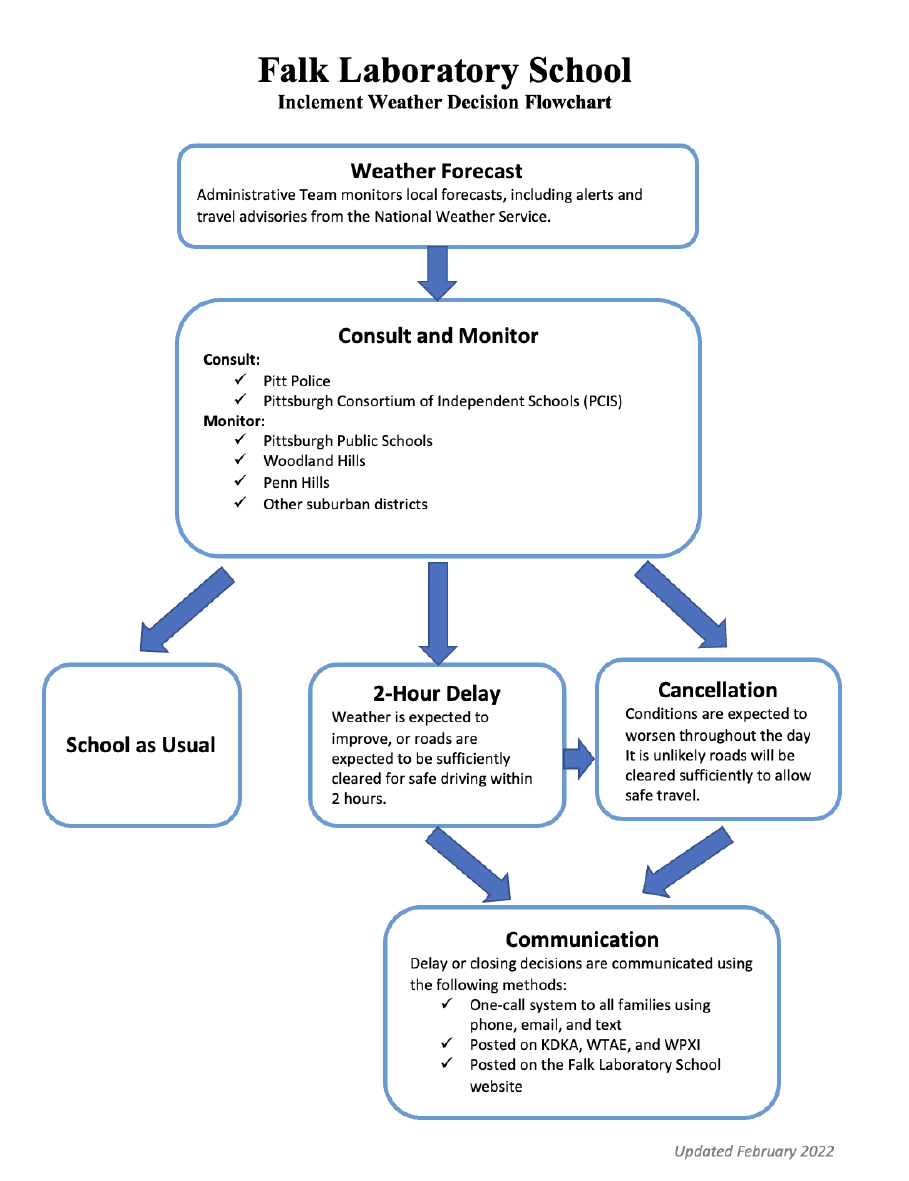
Fanny Edel Falk Laboratory School
University of Pittsburgh
Faculty Handbook
2023-2024
Welcome to the Fanny Edel Falk Laboratory School at the University of Pittsburgh. Whether you
are new to the school, or have been with us for many years, we are truly happy that you have
chosen to teach at Falk, and to offer our community your unique set of skills, understandings, and
competencies.
This Handbook is intended to provide an outline for teachers to follow when settling in and
developing professionally, as educators, at Falk School. The handbook includes policies and
norms for faculty. You are expected to familiarize yourself with, and abide by, the content of this
document. Feel free to ask questions and/or make suggestions, as we encourage open
communication in working together to maintain a positive atmosphere and a successful school.

Falk Faculty Handbook
2
The Falk School Faculty Handbook serves as an addendum to the University of Pittsburgh Faculty
Handbook, which contains useful and relevant information about your employment status at our
institution. You may access the University of Pittsburgh Faculty Handbook here:
https://www.provost.pitt.edu/faculty-handbook.
Because Falk Laboratory School is a largely self-funded (through the tuition paid by
families/caregivers) and, because of our 1931 legal charter, a semi-autonomous unit of the
University, some aspects of faculty appointments at Falk differ from those in other units which
serve undergraduate or graduate students and programming at Pitt.
I. Our School
Falk School’s mission is to be a progressive, experimental, and demonstration elementary school.
To give yourself a comprehensive view of our school familiarize yourself with our website. First
read the “Overview” and the “Director’s Welcome.” Develop a good sense of who we are by
reading our history, mission, and philosophy. Be able to speak to the functions of a laboratory
school (see also: IALS: International Association of Laboratory Schools,
http://www.laboratoryschools.org/ ) and the tenets of progressive education (read:
http://www.alfiekohn.org/article/progressive-education/). Take time to talk with colleagues, your
mentor, your team leader, and the administration to help develop your knowledge and
understanding of our school.
When you are ready to develop your own bio page, contact our Communications Manager for
assistance.
A. What We Wish for Our Children
Falk’s “Wishes for Our Children,” created collaboratively by the faculty and staff of our school, are
the principles that guide the instruction we provide and the relationships we forge with our
students and their families.
Since these wishes embody a philosophical disposition in how we see the developing and learning
child while they are students at Falk, we ask that you spend some reflecting of each wish.
1. We want our children to understand that any learning endeavor depends primarily on
them.
2. We want our children to have a deepening relationship with something that arises out of
their own personal interests.
Falk Faculty Handbook
3
3. We want our children to have a growing and deepening intellectual interest in at least one
curricular area.
4. We want our children to make their best effort in their academic course work.
5. We want our children to have a successful organizational style.
6. We want our children to use educational tools in developmentally appropriate ways to
deepen understanding.
7. We want our children to have a balanced perspective on contemporary trends and world
issues.
8. We want our children to have reverence for the natural world.
9. We want our children to have a deepening understanding of the aesthetic dimension of the
world.
10. We want our children to be aware of the space around them and share in its maintenance.
11. We want our children to appreciate the uniqueness of individuals and celebrate the
differences.
12. We want our children to grow in the experience of doing for others.
13. We want our children to acknowledge their debt to the work of others.
14. We want our children to understand how to make and maintain a friendship.
15. We want our children to know how to handle themselves appropriately in social situations.
16. We want our children to understand the validity of their feelings and their responsibility for
their actions.
17. We want our children to know how to make healthy decisions concerning diet and
nutrition.
18. We want our children to engage in physical activities that become meaningful in their lives.
19. We want our children to experience the satisfaction of working with their hands.
20. We want our children to see quiet and relaxation as necessary components of learning.
21. We want our children to develop the ability to be attentive.

Falk Faculty Handbook
4
II. Policies and Procedures
The majority of resources for faculty can be found on the Resource Page in Blackbaud.
Blackbaud is the online hub for the Falk community. Upon joining the Falk community, you should
receive an invitation to Blackbaud. All links for relevant school-related apps and websites should
be found on the ‘Resources’ tab within Blackbaud. If you are having difficulty accessing your Falk
Blackbaud account, contact the Falk Technology Coordinator.
A. Attendance (including Arrival and Departure Times for Faculty)
Faculty hours are 7:45 am to 3:45 pm Tuesdays through Fridays, and 7:45 am to 5:00 pm, on
Mondays to allow for weekly faculty meetings. If you will be arriving late to school for any
reason, contact your Division Director and your teaching partners as soon as possible. This is
essential in order to ensure coverage is in place for student arrival.
i. Arriving or Departing during School Hours
When arriving after 7:45 am or leaving before 3:45, remember to sign in or out at the
kiosk in the lobby near the Front Desk. Any questions concerning the use of the kiosk,
including your log-in information, should be directed Technology Coordinator.
ii. Faculty Absences
Discuss planned absences with your Division Director at least one week in advance, so
coverage can be arranged as needed. Requests for consecutive personal days should be
directed to the School Director for approval. For planned absences, you must supply all
the necessary lesson plans and materials. It is best to speak with your substitute directly
if possible.
If you are ill, or have an emergency, text or submit your absence on Instasub to your
respective Division Director, preferably before 8:30 PM the night before, or no later than
7:00 am the morning of, to give as much time as possible to arrange a substitute. Upload
your Substitute Teaching folder* to the shared Google Drive for emergencies.
If you need to be out for an extended period due to personal illness or to care for a
family member, contact your Division Director and/or Director of Administrative
Operations, to discuss your options under the FMLA act. Information can also be found in
the Resource Board in Blackbaud in ‘Faculty Employment Resources’.
Note: Avoid requesting days off immediately before or after extended school breaks
(e.g., Thanksgiving break, winter break, spring break). These requests will only be
granted in extreme cases.
*Falk Substitute Teacher Packet should include:
1. Class List
2. Necessary Information and plans for students with special learning needs
3. Seating chart(s)
4. Description of class routines
Falk Faculty Handbook
5
5. Schedule
6. Classroom Management Ideas
7. Extra Time Fillers
8. Emergency Lesson Plans
9. Names of faculty team members, administration, and staff
10. Other Duties (dismissal, lunch, etc.)
11. Location of Emergency Folder/Flip Chart
12. Select Falk School Policies
iii. School Delay/Cancellation Due to Inclement Weather
In the case of inclement weather, the decision to close, or delay the opening of, the school
and offices will be determined by the School Director (in consultation with other
administrative staff and emergency preparedness personnel). Decisions to close, delay, or
maintain normal hours of operation are independent of the University of Pittsburgh’s
operational policies. Due to our dependence on public busing for many of our students, if
Pittsburgh Public Schools cancel or delay a school day, Falk School will usually (but not
always) cancel or delay that day as well.
Falk School uses an automated message system for notification of school closures or
delays. You will be notified with our Ruvna system via text or phone call. Falk will also post
any delays and cancellations on our website, as well as the major local television stations
(KDKA, WPXI, WTAE). On two-hour delay days, faculty and staff will be expected to arrive
by 9:45 am for a 10:00 am arrival for students. Faculty and staff are not expected to report
when the school day is canceled unless otherwise notified.

Falk Faculty Handbook
6

Falk Faculty Handbook
7
iv. Evening & Weekend Duties
All Falk School teachers will be required to attend some evening functions, and far less
frequently, a weekend function. These duties will usually be related to your role as a
member of a specific teaching team or as an instructor within a particular
curricular/content area.
Some examples:
1. K-8 classroom teachers host conferences that involve an evening component
2. Primary teachers have a two-day Kindergarten visit event, one day of which is held
on Saturday
3. Middle School’s four-day, three-evening environmental trip
4. Concerts, musical performances, and other student-centered evening events
The Falk School administration will from time to time need to add or delete from the list of
required weekend or evening obligations, as circumstances dictate, but every attempt will be
made to keep changes to a minimum.
v. Attendance Records for Students
a. The instructional day begins at 8:30 am for all students.
b. Each classroom teacher and middle school advisor is responsible for classroom
attendance. Attendance will be taken using Blackbaud. The instructional day begins at
8:30 am.
c. Students will be issued a tardy slip at the Front Desk beginning at 8:30 am.
If parents have told you their child(ren) will be absent, make note of this in the comments
section of Blackbaud. Student Travel Requests: All travel requests from families should be
directed to the Travel Request Form found on the Blackboard Resource Tab.
A backup paper copy of the classroom student roster will be provided in the case of
technical difficulties and for substitute teachers. The paper copy should be delivered to the
Front Desk by 8:40 am.
A daily attendance report will be emailed to all faculty and staff for verification once the
attendance recording is complete.
B. Faculty Growth, Evaluation, and Expectations
Demonstration Teachers are provided with yearly, renewable contracts and therefore are
under yearly review. The same is true for Visiting Demonstration Teachers. Master Teachers
are granted three-year contracts and are reviewed in the penultimate year of each contract.
Consult the Conditions of Employment for detailed information on the requirements and
expectations of your contract.
The most important aspect of professional development at Falk is the faculty growth process.
All faculty members are expected to fully engage in a process of reflection and growth

Falk Faculty Handbook
8
regarding their multiple roles as educators. Faculty members will meet with their assigned
Division Directors annually to establish goals and a personal action plan for the coming school
year. Faculty are then expected to meet with their respective Division Director at regular
intervals to discuss progress towards identified goals.
Planning & Preparation for Instructional Duties
Teachers are expected to have well-developed unit plans for each unit they teach, as
well as individual lesson plans. Units that come ready-made in texts such as
mathematics, do not have to be entirely rewritten, though there should be evidence
that these units were thoughtfully followed and supplemented, when and where
necessary, with additional activities or assessments based on a teacher’s
understanding of the needs of their particular group of students.
Teachers should be able to articulate the lesson objectives and provide unit plans at
the request of administrators, content specialists, and/or curricular chairs.
Professional Development
Falk School is a community of professional educators passionately engaged in the
collaborative work of working with children and adolescents. As such, there is a
recognition that attention must be paid to the professional and personal needs of
each teacher. Falk is committed to providing the structure and financial resources
necessary for the professional growth of its faculty.
Each year the Director allocates funding for faculty interested in participating in
professional learning and growth opportunities, including:
• Local, regional, and national workshops and conferences
• On-site workshops and presentations, ones featuring invited outside
speakers or in-house presentations made by fellow faculty members and
administrators
• Summer curriculum development work
The coordination of professional development efforts is the collective responsibility
of the Director and others on the administrative leadership team. Faculty who are
interested in attending a workshop or conference should follow these guidelines
when asking for funding:
• Discuss the possibility of presenting at a workshop or conference with your
Division Director before submitting a proposal.
• If the proposed event is one directly related to professional development
priorities articulated in one’s professional goals or an official school initiative,
faculty members should discuss the possibility of attendance with the
Division Directors and Curriculum Chairs and then submit requests to the
Director.

Falk Faculty Handbook
9
C. Dress
Our dress expectations for faculty and staff at Falk School are casual, yet professional. We
trust you can determine this for yourself. If you have a question about any aspect of
professional dress, consult with your team leader, or Division Director.
We have a “school attire” policy for students that is included in our Family Handbook. We
are the role models for this code. We should not wear items of clothing that our students are
not allowed to wear.
We must also set the standard for our individual classrooms. Anyone working in our
classrooms, such as interns, student teachers, and volunteers, must also dress appropriately.
If an intern or student teacher is not dressing appropriately it is best to address this matter
with another teacher present. Since personal choice in clothing is a delicate issue, you
should protect yourself by having a colleague present during the discussion.
D. Scent-Aware Policy
Falk School is committed to a safe and healthy environment for faculty, staff, students, and
visitors, and as such has developed a set of scent-aware guidelines. Exposure to perfumes
and other scented products can trigger serious health reactions in individuals with asthma,
allergies, migraines, or chemical sensitivities. Avoid using overly scented or aggressively
scented personal hygiene products. Likewise, refrain from using plug-in room air fresheners,
burning scented candles, or essential oil diffusers in your classrooms or offices.
E. Cellphone/Computer Usage
As cellphones have become a more ubiquitous feature of our society, they have likewise
been an incredibly distractive force for us all. In keeping with our responsibilities, adults
should be thoughtful of their cellphone usage. We ask that you do not use your cellphone for
personal matters whenever you are with students, whether teaching, at recess, walking
through the halls, in the cafeteria, in an assembly, and so on.
We expect student teachers, interns, and student workers to follow the above policy
concerning cellphone use.

Falk Faculty Handbook
10
F. Parking & Transportation
Falk School/University of Pittsburgh does not provide parking for its employees. We have some
parking locations for emergencies, drop-offs, and visitors, but these spots cannot be relied on
for an employee’s daily parking needs. Everyone must secure parking for themselves, from some
privately owned lots in the neighborhood or through the University of Pittsburgh. The University
provides free bus service from various parking locations across the Pitt campus and throughout
the city through the Pittsburgh Regional Transit system.
Parking on the University of Pittsburgh Campus
The Parking Services Office is responsible for assigning parking permits. Detailed information is
available online at http://www.pts.pitt.edu/parking/permits/faculty-staff. In addition, the office
offers a Motorist Assistance Program to unlock and jump-start vehicles free of charge when
parked on or near campus locations.
Parking Services: 412-624-4034 or [email protected]
SafeRider Service
Van Call is the University’s evening escort service. It is available from 7:00 p.m. to 3:00 a.m.
Sunday through Wednesday, and from 7:00 p.m. to 5:00 a.m. Thursday through Saturday to
transport riders from locations in the Oakland area to campus buildings. This service is provided
by calling 412-624-1700.
Visitor Parking
Short-term visitor parking is available and should be arranged with the Front Desk
Administrative Assistant.
University Transportation System
Faculty members are entitled to ride the University of Pittsburgh's buses and shuttles at no
charge by presenting their valid University of Pittsburgh identification card to the driver. Most
buses and shuttles have a 20- to 30-minute loop. If there are any questions, call the 24-hour
information line at 412-624-8800 or e-mail at transsy[email protected].
G. Benefits
As a faculty member at Falk School, you are an employee of the University of Pittsburgh. Pitt's
benefits offerings are among the region's best. Among other benefits, Pitt offers a variety of
medical plans, tuition remission, life insurance, optional dental and vision coverage, and a
retirement plan matching $1.50 for every $1 you invest.
Visit the Human Resources website to learn more: http://www.hr.pitt.edu/benefits/

Falk Faculty Handbook
11
H. Emergency & Safety
Falk School has established procedures for a variety of emergency situations including fire,
lockdown, evacuation, active shooter, and severe weather. These procedures will be reviewed
with all faculty and staff at the start of each school year. Familiarize yourself with the Emergency
Management “Quick Guide” laminated flip booklet and the Evacuation Route Map for your
room. Any questions should be directed to the School Nurse.
Confidentiality
In compliance with HIPAA (Health Insurance Portability and Accountability Act) and FERPA (The
Family Educational Rights and Privacy Act), medical and educational information must be kept
confidential. At the start of every school year, Falk’s school nurse will provide information
within the Blackbaud Student Information System regarding medical conditions, allergies, and
parental requests for each child that you teach. Information about individual learning plans will
be provided by the Student Services Team and also noted in the Blackbaud system. This
information must be kept confidential and should only be shared with the professionals who
work directly with the individual students.
Employees are expected to use appropriate judgment and caution in communications
concerning students, families, employees, and alumni to ensure that personally identifiable
information remains confidential. Conversations about specific students must not take place
in communal areas such as the teacher workroom, hallways, or the cafeteria, and never in the
presence of other students.
Peanuts & Tree Nuts
Falk School does not allow the consumption of peanuts, tree nuts, or peanut/tree-nut-based
food products anywhere in the school building other than our cafeteria during lunch. This is an
essential policy to keep our community safe. There are no exceptions to this policy.
Fire Drills
A fire procedures sheet will be posted in your area. Familiarize yourself with the procedures. We
have several unannounced fire drills each year. Take your emergency backpack with you to your
designated waiting area.
Security
The safety of all persons in the building depends on your attention to security in your area.
Before you leave the building, ensure that all windows and doors in your classroom are closed
securely and locked. DO NOT prop open any doors for easy access during or after school hours.
This includes the door from the mulch playground.
School-provided teacher laptops and Chromebooks must be secured at all times. Student and
teacher laptops not in use, as well as all valuables, should be stored in a locked classroom or
office. Upon leaving the building, remember to turn off any machine/equipment that you used.

Falk Faculty Handbook
12
If you plan to be in the building during non-school hours, use the swipe-card to gain entry.
If you are working late at night at night on your own, note the University of Pittsburgh offers a
SafeRider program. This free service operates during the fall and spring semester and provides a
reliable, safer alternative to walking alone at night. More information can be found here:
https://www.pts.pitt.edu/transportation/shuttle-services/saferider
As always, be aware of your surroundings while in the building and surrounding areas. Report
any suspicious activity to the Pitt police as soon as possible.
Emergency Numbers:
4-2121 (412-624-2121) Campus Emergencies
4-4040 (412-624-4040) Campus Non-Emergencies
800-222-1222 Poison Control
800-932-0313 Childline
412-360-6911 VA Hospital Police Operation
Clearances & Background Checks
The State of Pennsylvania requires anyone who works or volunteers in a school to maintain
certain clearances and background checks in order to work with children. Falk School and the
University of Pittsburgh must legally abide by all of these directives. Consult page one of the
Conditions of Employment for the complete, detailed list.
All Falk Lab School employees, volunteers, and many visitors, are required to possess the
following mandatory Child Protection Clearances:
· Pennsylvania Criminal History Report (PATCH)
· Pennsylvania Child Abuse History Clearance (ChildLine)
· FBI Criminal History Report
Beginning in the 2022–2023 school year, Falk Lab School will utilize ProVerify to collect and
monitor all Falk volunteer and visitor clearances. ProVerify will contact all future visitors and
volunteers directly with directions for either (1) obtaining new clearances; or (2) uploading
existing clearances. Additionally, if an individual’s clearances expire during the duration of the
program (i.e., the school year), ProVerify will also contact that individual to inform them that
they need to renew their clearances.
Falk Faculty Handbook
13
Clearances are required, however, for the following situations:
· Celebrating a birthday with your child in school
· Eating lunch with your child
· Giving a classroom talk or reading to your child’s class

Falk Faculty Handbook
14
Visitors
During the school day, only one entrance to the building is available to the public. That area is
strictly monitored, and access is permitted only when the visitor has been identified and the
door is electronically released. All visitors are required to register and are issued barcoded name
badges using visitor software. Visitors are checked out before they leave. Do not let anyone
into the building that you do not recognize.
Keys & Identification Cards
The Assistant to the Director will provide you with external access via swipe card and, when
necessary, internal keys (most spaces in the building are currently accessible by swipe cards,
including classrooms). Keys and I.D. cards belong to Falk Laboratory School and must be
returned on the final employment day. Keys issued are the responsibility of the employee, and
not subject for loan to a third party. An administrative fee will be assessed for any lost or stolen
keys. Report lost I.D. immediately to the Director of Administrative Operations. Your building
access will be disabled until you obtain a replacement ID card through Panther Central.
Two-Way Radios
Anytime you take students outside for recess or a class, you must take a two-way radio from the
cabinet located in the lobby. Notify the front desk prior to leaving the school grounds with
students.
Return the unit to the cabinet when you come back in from recess. If you have an assigned
radio in your classroom office, use that specific radio for your class recess or dismissal duty.
The two-way radios should be set to the channel assigned below.
Channel Assignments:
Channel 1 (A) Main – administration, custodial, and emergency (also used for dismissal)
Channel 2 (B) Falk Woods - class
Channel 3 (C) Outside – outdoor recess, gym, any class leaving the building but on school
grounds
Channel 4 (D) Extended Day Program
I. Event Scheduling
Field Trips and Events
All events occurring in shared spaces or off-site, must be scheduled using the FMX, internal
event management website: falk.gofmx.com. Discuss field trips and larger events with your
Division Director prior to scheduling or entering into any agreements with outside
organizations. Once field trips are approved, staff can help in supporting transportation,
funding, and service agreement requests.

Falk Faculty Handbook
15
Room Set-up
If you plan to use a shared space that will require special setup (e.g., chairs, sound equipment),
this must be included in your FMX request. This is required so there are people available for set
up.
IMPORTANT REMINDER: You must take a first aid kit with you on your field trip. You must also
be aware of your student’s allergies in case you need to take medicine along such as Epi-pens.
The School Nurse will prepare specific allergy medications for individual students as needed.
J. Building Maintenance
All non-emergency building maintenance requests should be submitted through the FMX,
internal event management website: falk.gofmx.com. This link can also be found on the
‘Resource’ page in Blackbaud. Report emergency building maintenance issues to the Front Desk.
in the event of a facility emergency after hours or during the weekend, call the University of
Pittsburgh Facilities Management Emergency line at 412-624-9512.
K. No Solicitation or Distribution
Falk School prohibits the solicitation, distribution and posting of materials at Falk or via email by
any employee, except as may be permitted by the administration. Individual classrooms and/or
student groups must seek approval from the Division Directors and/or the School Director for
any solicitation or fundraising initiatives.
L. Faculty & Staff Lounge
The Faculty & Staff Lounge (i.e., mail room) is for the exclusive use of the faculty and staff of Falk
School. This includes student workers and contract employees (tutors, substitute teachers,
student teacher supervisors, etc.). Students and other visitors are not to access the lounge and
mail room without an accompanying faculty or staff member.
M. Mail
All mailboxes are located in the Faculty & Staff Lounge, Room 113. Mail arrives daily and is
distributed to the mailboxes. All outgoing mail must be placed into the outgoing mail bin in the
workroom. All personal mail must have a stamp.
N. Teacher Workroom
All Faculty must be trained on workroom equipment prior to first use.

Falk Faculty Handbook
16
Check over your work area prior to leaving to ensure you have returned unused materials and
discarded used materials.
Report any maintenance issues for the workroom equipment to the Front Desk.
O. Lost and Found
All displaced personal articles are placed in the school lost and found chests located on each
floor.
Several times throughout the school year, Lost & Found items will be consolidated and
displayed, with families receiving notification in the newsletter to retrieve their items by an
assigned date. All unclaimed items will be donated.
P. Telephone Usage for Students
Students must have their teacher’s permission to use the phone to make outgoing calls at the
Front Desk or in a classroom. Students should not use their personal devices to make calls at
any point during the school day.
Q. Meals/Cafeteria
As part of Falk’s compensation and benefits package, all faculty and staff receive free lunches in
our cafeteria. Orders for lunches must be placed in advance through LunchTab. This link can be
found on the Resources page in Blackbaud.
R. Legally-Mandated Reporting & Trainings
Every Falk School faculty member must complete the trainings listed below. New and current
employees will receive notification of trainings through Human Resources.
i. Conflict of Interest (to be completed in the spring of each year)
The University of Pittsburgh has outlined specific areas of conflict of interest that pertain
directly to our faculty. In general, Falk School faculty do not work for current Falk School
families outside the school and outside the school day for reasons of conflict of interest. Two
exceptions are for reasons of academic services provided to our families: instrumental lessons
and tutoring (tutoring has its own guidelines: see Conditions of Employment, Appendix 3).
ii. Preventing Discrimination and Sexual Violence: Title IX, VAWA, and Cleary Act Training
iii. Child Abuse Recognition and Reporting

Falk Faculty Handbook
17
iv. CPR Training Policy: Faculty and Staff
CPR training is mandatory for all Falk School faculty and staff. All employees are required
to obtain CPR certification every two years. Falk School typically provides on-site training
opportunities each fall for faculty and staff to obtain the required certification. Employees
who are unable to attend one of the on-site training opportunities will be required to
obtain CPR certification at an off-site facility within a specified time period and at the
employee’s expense. Not completing the CPR training by the specified time period may be
grounds for disciplinary action.
S. Committees & Clubs
There are many opportunities to become involved in life at Falk Lab School outside the
classroom in the form of committee work and professional learning communities. A
presentation of our current committees and professional groups will be shared in early
September. Chairs of these committees meet with the administration as needed.
T. Important Websites
My Pitt: my.pitt.edu
To access this site you must log in with your Pitt username and password. On this site you have
access to many important features:
1. Pitt email
2. Pitt Works
a. benefits information
b. monthly pay statements
4. 401K contributions
5. Pitt Directory
Our member organizations
IALS: International Association of Laboratory Schools, http://www.laboratoryschools.org/
NAIS: National Association of Independent Schools, http://www.nais.org
PAIS: Pennsylvania Association of Independent Schools, https://www.paispa.org
PCIS: Pittsburgh Consortium of Independent Schools, http://pcis.info/
PEN: Progressive Education Network, https://progressiveeducationnetwork.org/
Y. Appendices
Photo and Video Consent
Each academic year, Falk asks parents to fill out a photo and video permission form. This form allows
Falk to use student photos and videos in our external publications, ads, and on our website. This form
does not cover permission for student teachers/interns and other non-Falk faculty to take or use
Falk Faculty Handbook
18
photos and pictures. Interns and student teachers who want to take photos or videos must create a
permission form and ask parents to sign it. In the form, the reason for the photo/video should be clear
as well as all ways in which the photo/video will be shared or used. Teachers, student teachers,
interns, and researchers must ensure that students who are not permitted to be photographed are
not in shared images. Student names are NOT to be included in any external publication.
Guidelines for When the Nurse is Out
If at any time you believe that emergency medical care is necessary,
call 412-624-2121 (on Univ. phone dial ext. 42121).
These guidelines are provided to manage the usually minor illnesses and injuries that may arise during
the school day when a nurse is not available. (In addition, very minor cuts, scratches, hangnails, paper
cuts, and bumps may be managed by the teacher in the classroom anytime you are comfortable with
doing so.)
The shelf to the right of the refrigerator in the Health Office contains commonly used first aid supplies
and is accessible to everyone. Baggies are in the second drawer from the refrigerator and ice can be
found in the freezer. An ice pack can be kept on a minor bruise or bump for 15-20 minutes.
Always use common sense and the first aid training you received at the beginning of the school year.
Decide if you can manage the student’s complaint in the classroom. Provide simple first aid for minor
injuries. For complaints of illness (sore throat, stomachache, headache, etc.), cool water and rest are
advised. However, keep in mind: Observation of the student tells a lot about what is really happening.
Does the child look and/or act sick? Does skin feel hot? (Students often complain of “feeling hot”; this
is rarely an indicator of a fever. Fevers are more likely to be accompanied by chills.) If you suspect a
fever, a thermometer is available in the Health Office.
Headaches, fatigue, etc., that occur before lunch or snack often disappear with some food. Encourage
students to eat breakfast every morning. Many stomach aches are actually empty stomachs.
Encourage drinks of cool water as the first treatment for any of these complaints. Crackers are
available in the drawer next to the refrigerator in the nurses’ office if needed.
If the nurse is out and you feel the student is too ill to remain in school, you may call the parent to
pick up the child. You must also notify the front desk to inform them the child will be picked up. Allow
the student to remain in the classroom until the parent arrives or to rest in the Health Office if an
adult is available to supervise. Physical space and staffing limitations in the school office do not easily
lend themselves to the care of ill children, and your willingness to manage minor illness/injuries in the
absence of a nurse are greatly appreciated.
Be aware that PA medication laws require a licensed health care professional to dispense any
medication, either prescription or over the counter.
Falk Faculty Handbook
19

Falk Faculty Handbook
20
Parent/Caregiver Interaction Guidelines
Guidelines for professional interactions between Falk employees and
colleagues who are also parents and close family members
As you know, Falk School places a very high value on the concept of community. As such, we are
fortunate to be able to provide faculty and staff with the opportunity to have their children
and/or other relations attend the school as students. While it is undoubtedly a joy to have
faculty/staff children at our school, at times relationships and partnerships that are rather
straightforward with our typical families can become complicated and, at times, challenging,
when they are with families whose children and relations attend the school.
The following is a set of basic guidelines designed to help establish and maintain positive
relationships between colleagues in order to ensure best possible learning experiences exist for
all our students.
Should:
Should not:
Faculty/Staff Member
who is working with a
colleague’s child(ren) or
relation(s)
1) Communicate, formally and not
informally (via email or phone call),
all information about a faculty/staff
colleague’s child or relation; refrain
from approaching a faculty
parent/relative at any point in the
academic day to discuss an issue
regarding their child(ren)
2) As with all student information that
is confidential, handle information
about colleagues’ children or
relations with care and discretion
3) Handle colleague’s children or
relations disciplinary or social-
emotionally-related needs as one
would with any other family in the
school
4) Involve, when the situation affords,
a second, non-colleague parent in
all correspondence, discussions, and
meetings regarding their child’s
needs
1) Stop a faculty/staff parent
or relation to discuss their
child’s behavior or
performance at any time
during the school day
2) Share confidential
information about a
colleague’s children or
relations with another
member of the faculty or
staff
3) Send colleague’s children to
them when they are having
disciplinary or social-
emotionally-related
challenges.

Falk Faculty Handbook
21
Should:
Should not:
Faculty/Staff Member
who is also a
parent/relation of a
current student or
students
1) Communicate, formally (via email
or phone call), all information
about their child or relation, to
that child’s teacher(s) and advisor;
do not approach a teacher or
advisor at any point in the
academic day to discuss an issue
regarding your child(ren) or
relation
2) Communicate changes in
dismissal plans to the Front Desk,
not to the homeroom teacher or
advisor
3) Have conversations with their
children/relations regarding when
it is appropriate to visit them
during the school day; remind
children that they must ask their
teacher or advisor for permission
to visit and must receive a written
pass when doing so
1. Stop their child’s/relation’s
teachers or advisor to
discuss their
child’s/relation’s needs or to
discuss any concerns that
they may have about the
colleague’s classroom, or
professional role with their
child(ren)
2. Share dismissal changes and
the like with the classroom
teacher or advisor
3. Allow their own children or
relations to visit whenever
they wish
Parents and teachers must be respectful of each other’s time and responsibilities. The ease of
stopping a colleague to mention something makes it easy to forget that this is the
parent’s/colleague’s place of employment and that they are immersed in their own professional
responsibilities. It can also be difficult for children to understand that boundaries at home and
school are different when it comes to seeing/interacting their parents.
Both parent and teacher can benefit by remembering to ask themselves if this is something they
would interrupt another parent’s workday to report or would they wait and send an email at the
end of the day? Interruptions by both faculty/staff colleagues and parents who are faculty/staff
colleagues should be kept to a minimum.
When situations arise in which parents or faculty/staff (or both) feel uncomfortable bringing up
concerns with the other party, they should always feel free to consult with the school counselor
or an administrator.

Falk Faculty Handbook
22
Aesthetic Guidelines for Public Spaces and Displays
Displays in public spaces should follow the guidelines below.
Defining Spaces:
• Public space refers to hallways, hallway bulletin boards, windows (hallway,
classroom, and doors), classroom doors facing hallways, stairwells, and rooms used
by most members of the community (restrooms, cafeteria, work room, mail room,
etc.)
• Private space refers to your room/classroom. There, you have the agency to design
the space as you see fit.
Guidelines for Public Spaces:
• Do:
o In hallways, use bulletin board space, the hanging lines, or bulletin board
strips for authentic student work.
o Be sure to include the context of the project when displaying and
documenting student work.
o If possible, include photos of students in the process of creating the project.
o If possible, invite colleagues to dialogue with you about the display.
• Do Not:
o Put anything on the outside of the wooden classroom doors.
o Put anything on the inside or outside of classroom windows that obscures
the view into the classroom space.
▪ This includes furniture that may block the upper part of the window.
▪ Exception: Authentic student artwork on transparent materials
o Display any commercially made posters/signs or teacher store visuals.
Remember, the children's authentic work should be the centerpiece of what we display in
public spaces. Authentic work refers to children’s own writing, images, and
representations in any content area or humanity; it's unique and individual; there are no
pre-prepared dittos/coloring book images that children fill in.
